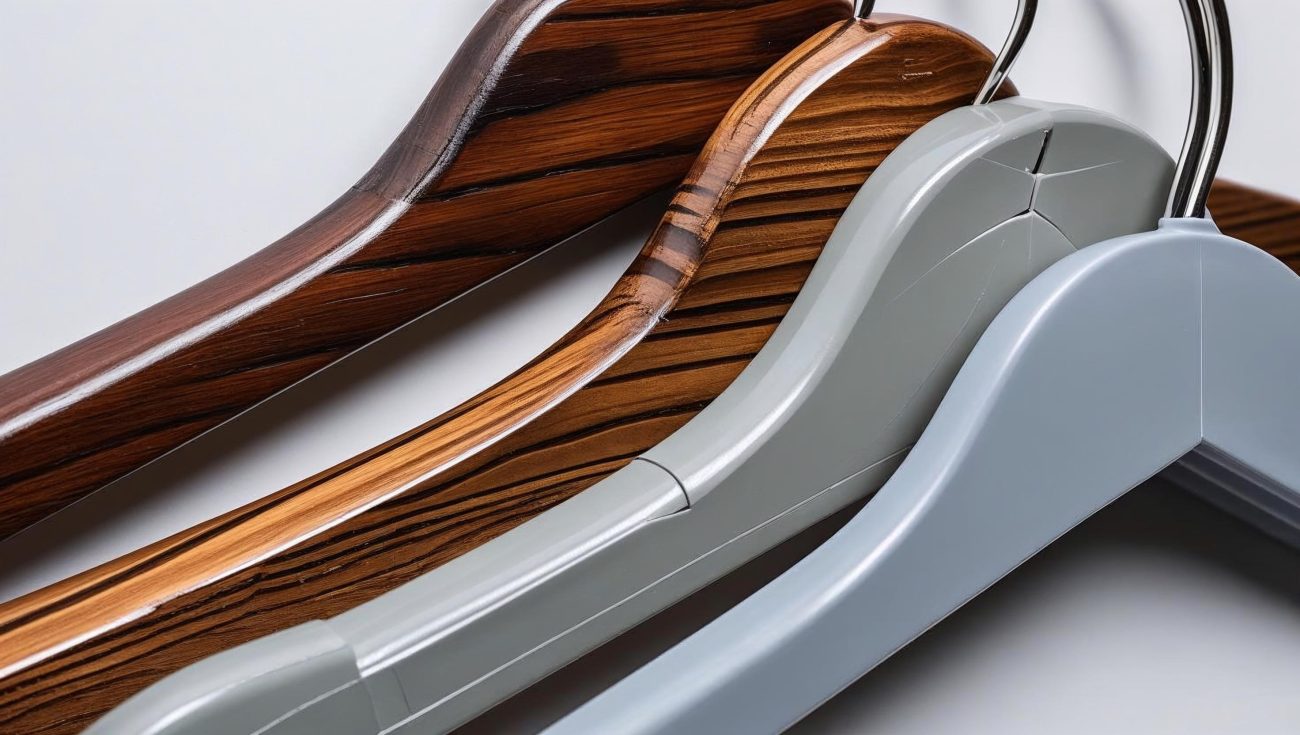In the world of clothing care, hangers are often overlooked — yet they play a crucial role in maintaining garment shape, quality, and presentation. Whether you’re organizing your closet, managing a boutique, or preparing garments for export, choosing between wooden and plastic hangers can significantly affect your brand’s image and the life of your clothing.
This blog compares the two most commonly used types of hangers: wooden hangers vs. plastic hangers. We’ll explore their features, benefits, limitations, ideal uses, and which type is best suited for your needs.

🪵 What Are Wooden Hangers?
Wooden hangers are made from solid or layered wood and often feature a natural or polished finish. They’re known for being durable, sturdy, and stylish. Available in a variety of wood types — such as maple, walnut, birch, and bamboo — wooden hangers offer a premium feel and are ideal for both home and commercial use.
What Are Plastic Hangers?
Plastic hangers are lightweight hangers made from polypropylene, polystyrene, or recycled plastic. They’re widely used due to their cost-effectiveness, versatility, and availability. Plastic hangers come in a wide range of colors and shapes and can be produced in bulk quickly.
Benefits of Wooden Hangers
1. Superior Strength
Wooden hangers can hold heavy garments like coats, suits, and jackets without bending or breaking. The thick shoulders also prevent slippage and maintain the garment’s structure.
2. Elegant Appearance
Wooden hangers are a popular choice for boutiques, showrooms, and luxury wardrobes. Their polished finish enhances brand image and looks premium.
3. Durability
Unlike plastic hangers that may crack under pressure, wooden hangers are long-lasting and can withstand repeated use for years.
4. Eco-Friendly Option
When made from sustainably sourced wood or bamboo, wooden hangers are biodegradable and better for the environment compared to disposable plastic.
5. Custom Branding
Wooden hangers can be engraved or printed with logos, making them perfect for businesses that want to showcase their brand identity.
🩳 Drawbacks of Wooden Hangers
- Higher cost compared to plastic alternatives
- Heavier weight can add to shipping costs or bulk storage
- Takes up more space in closets due to thickness
👕 Benefits of Plastic Hangers
1. Affordable & Accessible
Plastic hangers are extremely cost-effective, especially for businesses or homes that need large quantities.
2. Lightweight & Stackable
These hangers are ideal for small closets, travel, or shipping as they’re light and take up minimal space.
3. Variety of Designs
From colorful kid-friendly designs to sleek black retail hangers, plastic hangers can be tailored for different aesthetics and uses.
4. Moisture Resistant
Plastic doesn’t absorb water, making it suitable for laundries and humid environments where moisture may damage wooden hangers.
5. Mass Production Friendly
For garment exporters, laundries, or wholesalers, plastic hangers can be produced and delivered in large volumes quickly and economically.
🧷 Drawbacks of Plastic Hangers
- Less durable – they may snap, bend, or warp with heavy clothing
- Shorter lifespan – especially in rough or commercial environments
- Environmental concern – unless made from recycled plastic, they contribute to plastic pollution
- Not ideal for formal wear – they can distort the shape of heavier or tailored garments

